Accounting Research Project: Theories and Contemporary Research
VerifiedAdded on 2022/10/12
|9
|2160
|473
Report
AI Summary
This accounting research project delves into the methodologies of qualitative research, aligning them with research objectives and questions. It identifies and evaluates regulatory, sustainability, and ethical issues within the context of accounting. The project critically assesses relevant accounting theories, such as matching principle and cost principle, providing commentary on their application. Furthermore, it offers a comprehensive review of literature, incorporating a critical analysis of contemporary research and practices, particularly focusing on ASX-listed companies and their corporate social responsibility. The project addresses the challenges of technological advancements in accounting and the importance of adapting skills and techniques to mitigate accounting issues. The research emphasizes the importance of ethical considerations and data protection throughout the research process, drawing conclusions based on the analysis of accounting research and the effective strategies. This report provides a detailed overview of the research process, from methodology to conclusion.
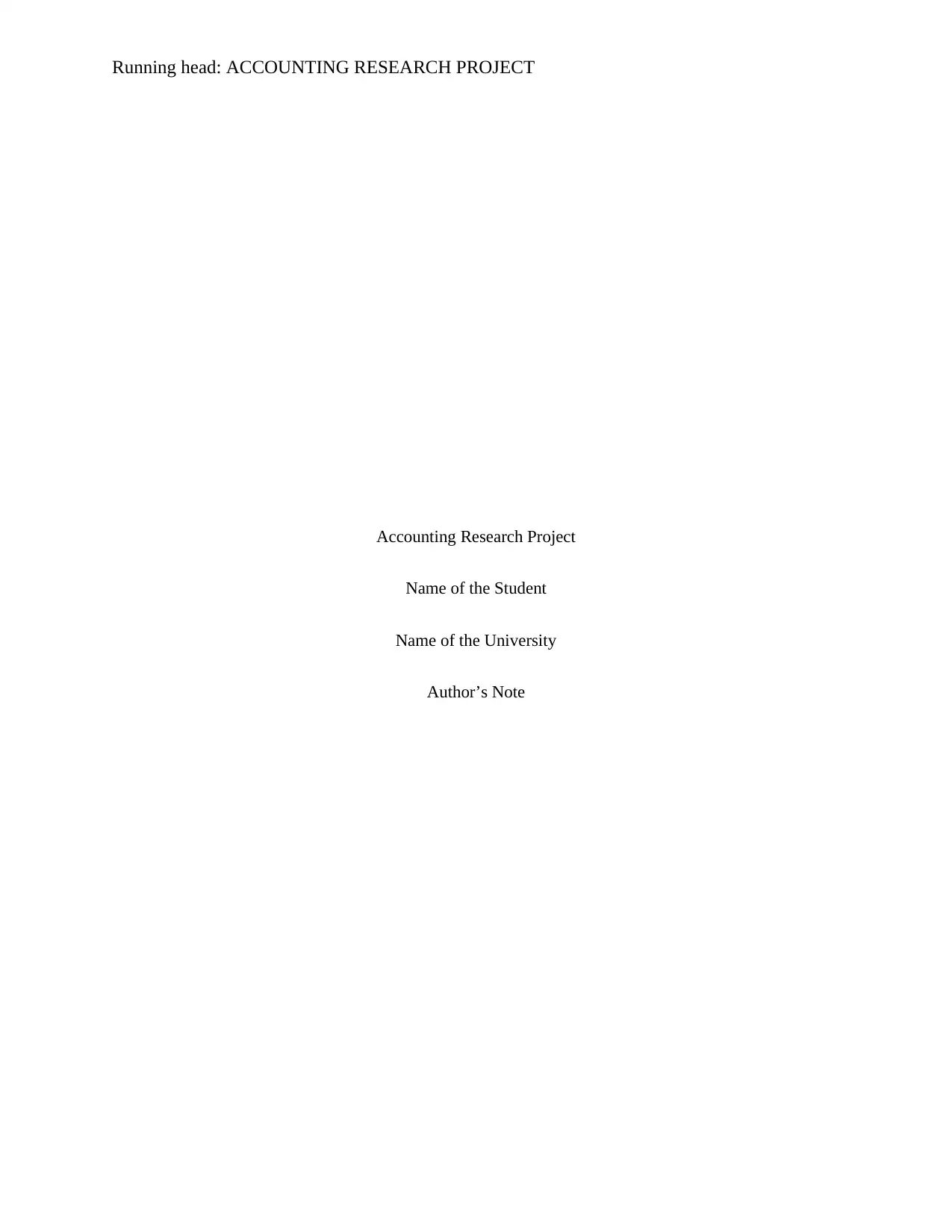
Running head: ACCOUNTING RESEARCH PROJECT
Accounting Research Project
Name of the Student
Name of the University
Author’s Note
Accounting Research Project
Name of the Student
Name of the University
Author’s Note
Paraphrase This Document
Need a fresh take? Get an instant paraphrase of this document with our AI Paraphraser
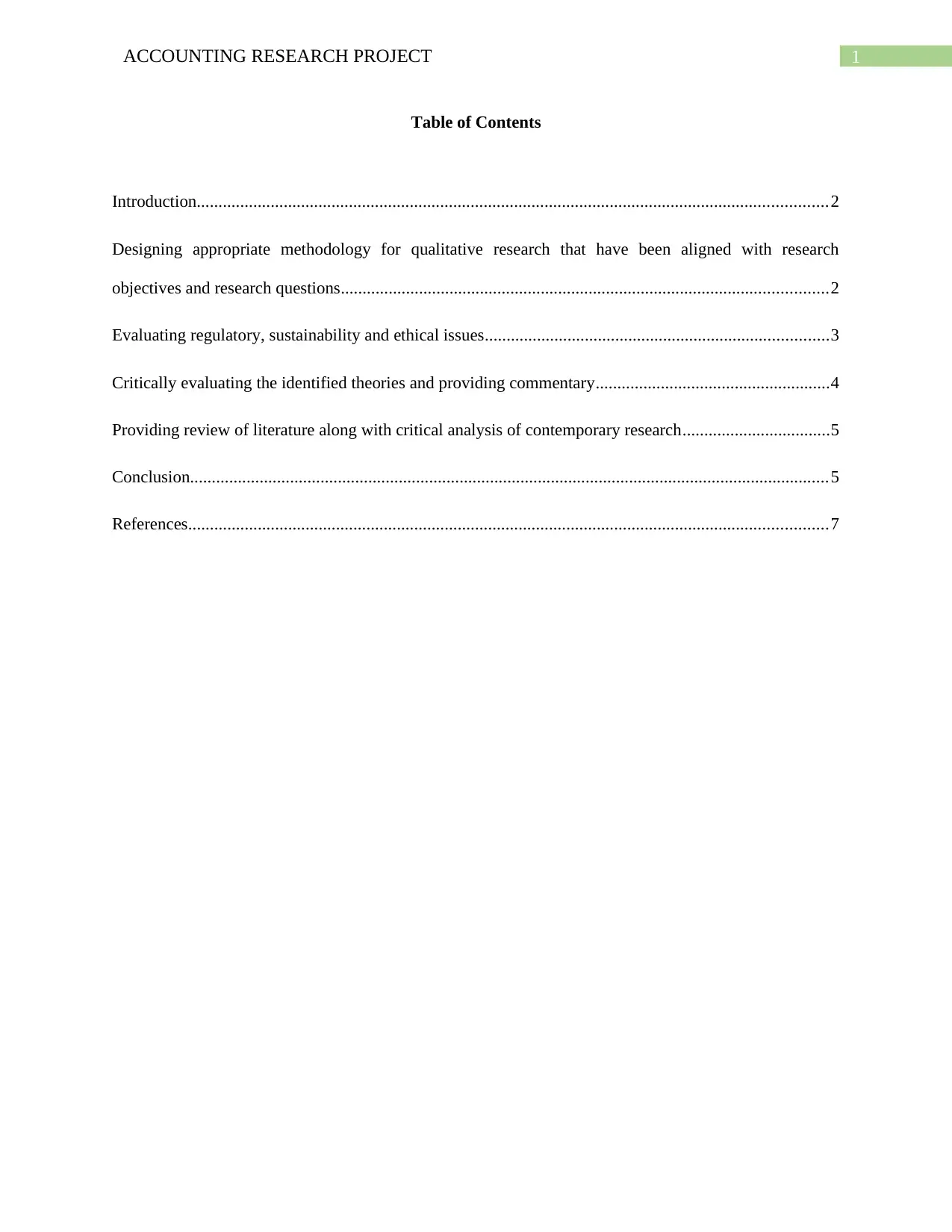
1ACCOUNTING RESEARCH PROJECT
Table of Contents
Introduction.................................................................................................................................................2
Designing appropriate methodology for qualitative research that have been aligned with research
objectives and research questions................................................................................................................2
Evaluating regulatory, sustainability and ethical issues...............................................................................3
Critically evaluating the identified theories and providing commentary......................................................4
Providing review of literature along with critical analysis of contemporary research..................................5
Conclusion...................................................................................................................................................5
References...................................................................................................................................................7
Table of Contents
Introduction.................................................................................................................................................2
Designing appropriate methodology for qualitative research that have been aligned with research
objectives and research questions................................................................................................................2
Evaluating regulatory, sustainability and ethical issues...............................................................................3
Critically evaluating the identified theories and providing commentary......................................................4
Providing review of literature along with critical analysis of contemporary research..................................5
Conclusion...................................................................................................................................................5
References...................................................................................................................................................7
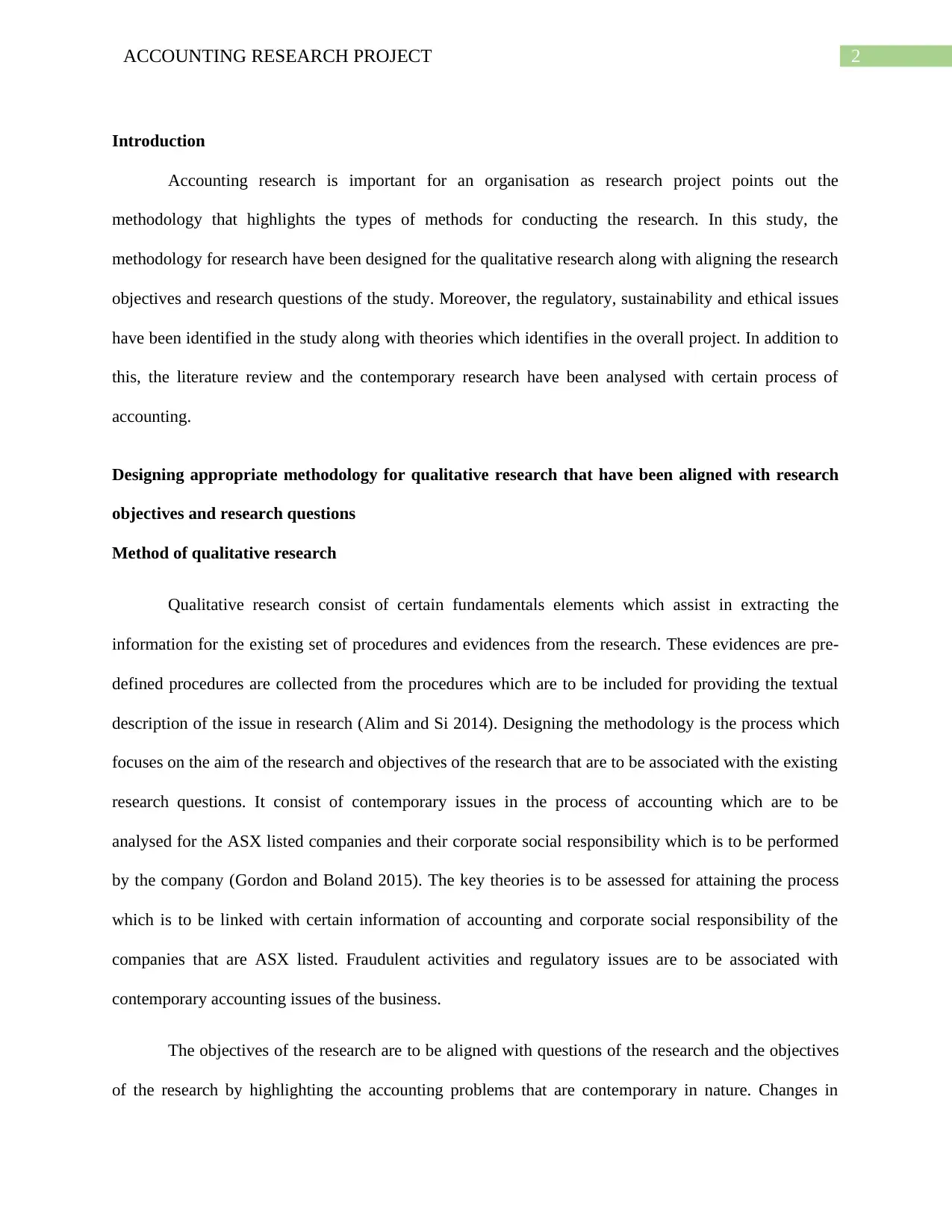
2ACCOUNTING RESEARCH PROJECT
Introduction
Accounting research is important for an organisation as research project points out the
methodology that highlights the types of methods for conducting the research. In this study, the
methodology for research have been designed for the qualitative research along with aligning the research
objectives and research questions of the study. Moreover, the regulatory, sustainability and ethical issues
have been identified in the study along with theories which identifies in the overall project. In addition to
this, the literature review and the contemporary research have been analysed with certain process of
accounting.
Designing appropriate methodology for qualitative research that have been aligned with research
objectives and research questions
Method of qualitative research
Qualitative research consist of certain fundamentals elements which assist in extracting the
information for the existing set of procedures and evidences from the research. These evidences are pre-
defined procedures are collected from the procedures which are to be included for providing the textual
description of the issue in research (Alim and Si 2014). Designing the methodology is the process which
focuses on the aim of the research and objectives of the research that are to be associated with the existing
research questions. It consist of contemporary issues in the process of accounting which are to be
analysed for the ASX listed companies and their corporate social responsibility which is to be performed
by the company (Gordon and Boland 2015). The key theories is to be assessed for attaining the process
which is to be linked with certain information of accounting and corporate social responsibility of the
companies that are ASX listed. Fraudulent activities and regulatory issues are to be associated with
contemporary accounting issues of the business.
The objectives of the research are to be aligned with questions of the research and the objectives
of the research by highlighting the accounting problems that are contemporary in nature. Changes in
Introduction
Accounting research is important for an organisation as research project points out the
methodology that highlights the types of methods for conducting the research. In this study, the
methodology for research have been designed for the qualitative research along with aligning the research
objectives and research questions of the study. Moreover, the regulatory, sustainability and ethical issues
have been identified in the study along with theories which identifies in the overall project. In addition to
this, the literature review and the contemporary research have been analysed with certain process of
accounting.
Designing appropriate methodology for qualitative research that have been aligned with research
objectives and research questions
Method of qualitative research
Qualitative research consist of certain fundamentals elements which assist in extracting the
information for the existing set of procedures and evidences from the research. These evidences are pre-
defined procedures are collected from the procedures which are to be included for providing the textual
description of the issue in research (Alim and Si 2014). Designing the methodology is the process which
focuses on the aim of the research and objectives of the research that are to be associated with the existing
research questions. It consist of contemporary issues in the process of accounting which are to be
analysed for the ASX listed companies and their corporate social responsibility which is to be performed
by the company (Gordon and Boland 2015). The key theories is to be assessed for attaining the process
which is to be linked with certain information of accounting and corporate social responsibility of the
companies that are ASX listed. Fraudulent activities and regulatory issues are to be associated with
contemporary accounting issues of the business.
The objectives of the research are to be aligned with questions of the research and the objectives
of the research by highlighting the accounting problems that are contemporary in nature. Changes in
⊘ This is a preview!⊘
Do you want full access?
Subscribe today to unlock all pages.

Trusted by 1+ million students worldwide
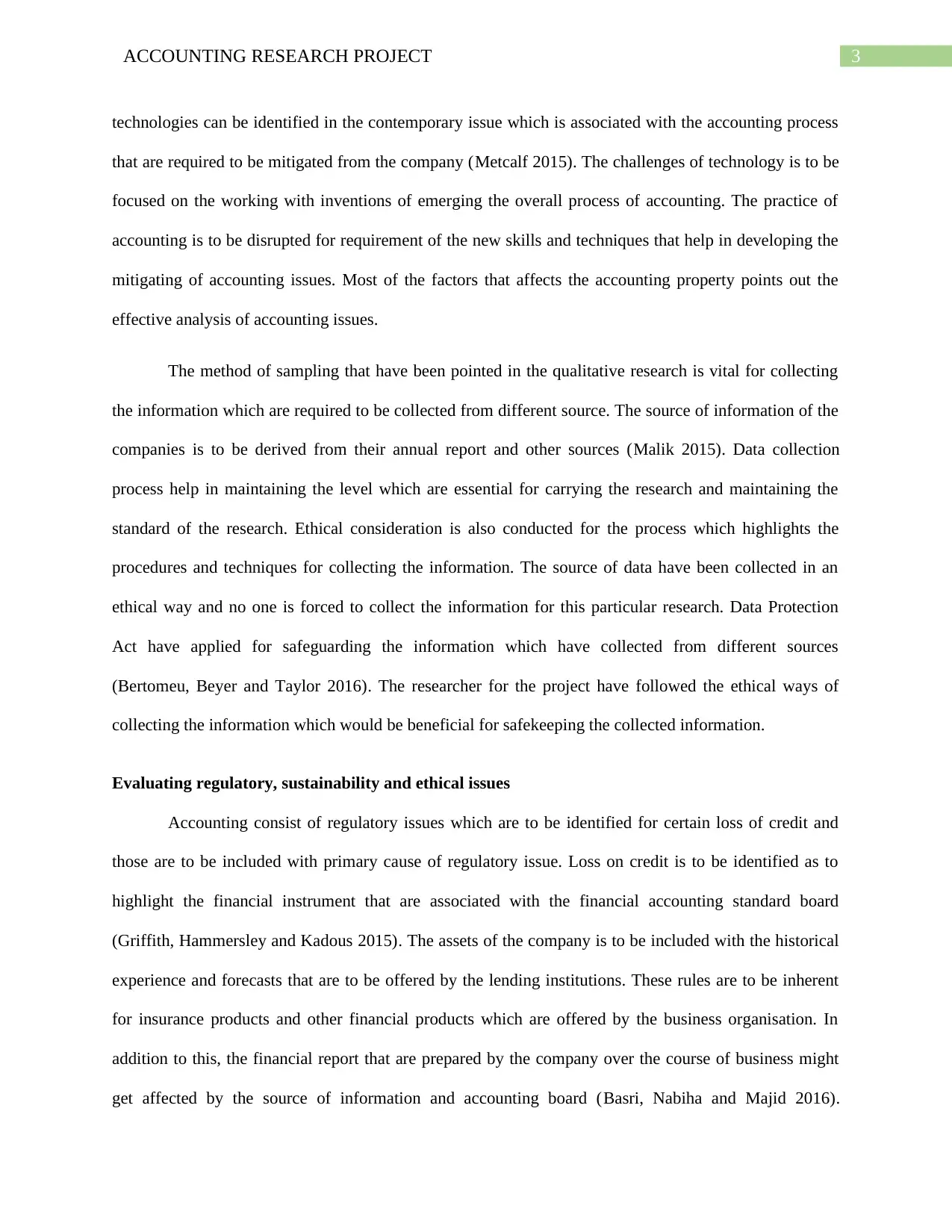
3ACCOUNTING RESEARCH PROJECT
technologies can be identified in the contemporary issue which is associated with the accounting process
that are required to be mitigated from the company (Metcalf 2015). The challenges of technology is to be
focused on the working with inventions of emerging the overall process of accounting. The practice of
accounting is to be disrupted for requirement of the new skills and techniques that help in developing the
mitigating of accounting issues. Most of the factors that affects the accounting property points out the
effective analysis of accounting issues.
The method of sampling that have been pointed in the qualitative research is vital for collecting
the information which are required to be collected from different source. The source of information of the
companies is to be derived from their annual report and other sources (Malik 2015). Data collection
process help in maintaining the level which are essential for carrying the research and maintaining the
standard of the research. Ethical consideration is also conducted for the process which highlights the
procedures and techniques for collecting the information. The source of data have been collected in an
ethical way and no one is forced to collect the information for this particular research. Data Protection
Act have applied for safeguarding the information which have collected from different sources
(Bertomeu, Beyer and Taylor 2016). The researcher for the project have followed the ethical ways of
collecting the information which would be beneficial for safekeeping the collected information.
Evaluating regulatory, sustainability and ethical issues
Accounting consist of regulatory issues which are to be identified for certain loss of credit and
those are to be included with primary cause of regulatory issue. Loss on credit is to be identified as to
highlight the financial instrument that are associated with the financial accounting standard board
(Griffith, Hammersley and Kadous 2015). The assets of the company is to be included with the historical
experience and forecasts that are to be offered by the lending institutions. These rules are to be inherent
for insurance products and other financial products which are offered by the business organisation. In
addition to this, the financial report that are prepared by the company over the course of business might
get affected by the source of information and accounting board (Basri, Nabiha and Majid 2016).
technologies can be identified in the contemporary issue which is associated with the accounting process
that are required to be mitigated from the company (Metcalf 2015). The challenges of technology is to be
focused on the working with inventions of emerging the overall process of accounting. The practice of
accounting is to be disrupted for requirement of the new skills and techniques that help in developing the
mitigating of accounting issues. Most of the factors that affects the accounting property points out the
effective analysis of accounting issues.
The method of sampling that have been pointed in the qualitative research is vital for collecting
the information which are required to be collected from different source. The source of information of the
companies is to be derived from their annual report and other sources (Malik 2015). Data collection
process help in maintaining the level which are essential for carrying the research and maintaining the
standard of the research. Ethical consideration is also conducted for the process which highlights the
procedures and techniques for collecting the information. The source of data have been collected in an
ethical way and no one is forced to collect the information for this particular research. Data Protection
Act have applied for safeguarding the information which have collected from different sources
(Bertomeu, Beyer and Taylor 2016). The researcher for the project have followed the ethical ways of
collecting the information which would be beneficial for safekeeping the collected information.
Evaluating regulatory, sustainability and ethical issues
Accounting consist of regulatory issues which are to be identified for certain loss of credit and
those are to be included with primary cause of regulatory issue. Loss on credit is to be identified as to
highlight the financial instrument that are associated with the financial accounting standard board
(Griffith, Hammersley and Kadous 2015). The assets of the company is to be included with the historical
experience and forecasts that are to be offered by the lending institutions. These rules are to be inherent
for insurance products and other financial products which are offered by the business organisation. In
addition to this, the financial report that are prepared by the company over the course of business might
get affected by the source of information and accounting board (Basri, Nabiha and Majid 2016).
Paraphrase This Document
Need a fresh take? Get an instant paraphrase of this document with our AI Paraphraser
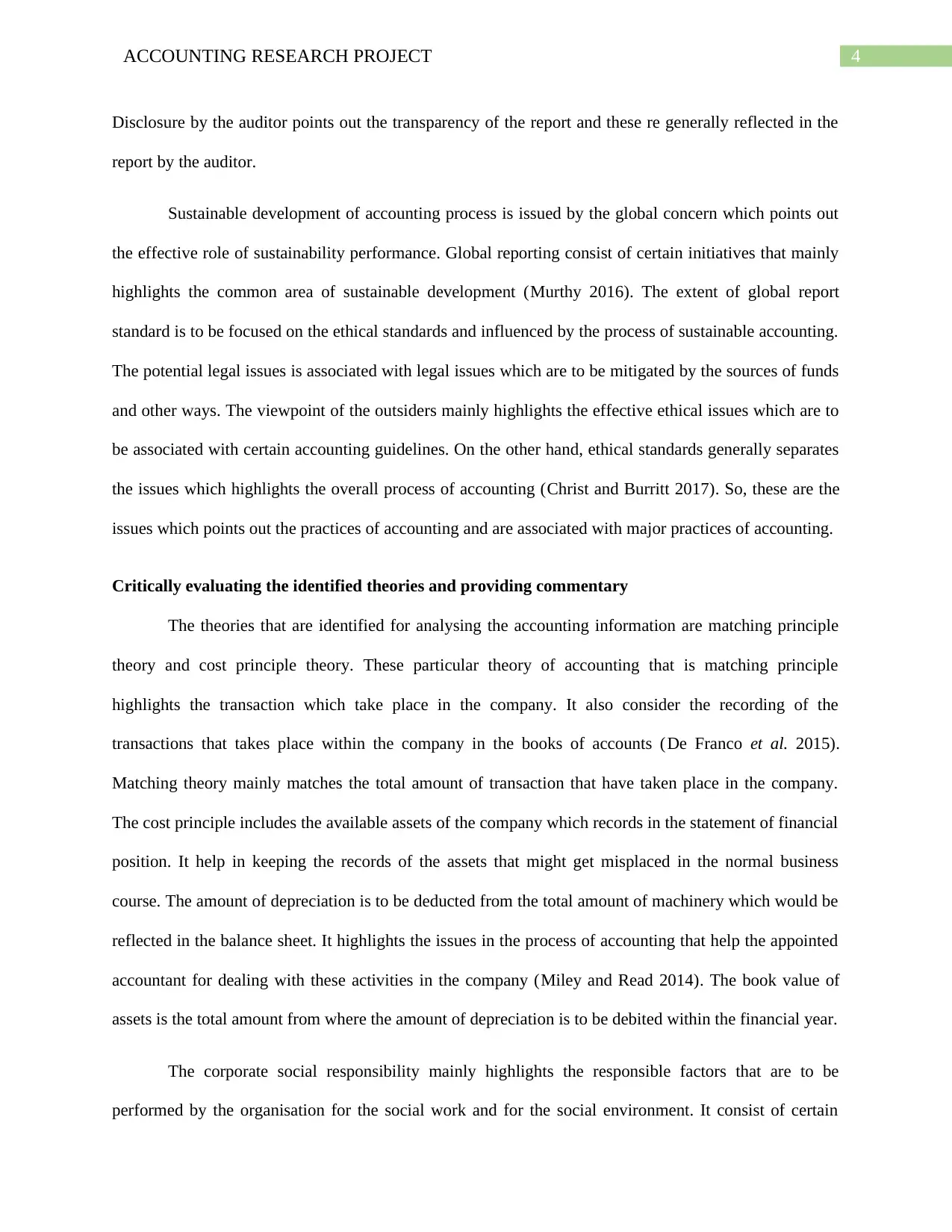
4ACCOUNTING RESEARCH PROJECT
Disclosure by the auditor points out the transparency of the report and these re generally reflected in the
report by the auditor.
Sustainable development of accounting process is issued by the global concern which points out
the effective role of sustainability performance. Global reporting consist of certain initiatives that mainly
highlights the common area of sustainable development (Murthy 2016). The extent of global report
standard is to be focused on the ethical standards and influenced by the process of sustainable accounting.
The potential legal issues is associated with legal issues which are to be mitigated by the sources of funds
and other ways. The viewpoint of the outsiders mainly highlights the effective ethical issues which are to
be associated with certain accounting guidelines. On the other hand, ethical standards generally separates
the issues which highlights the overall process of accounting (Christ and Burritt 2017). So, these are the
issues which points out the practices of accounting and are associated with major practices of accounting.
Critically evaluating the identified theories and providing commentary
The theories that are identified for analysing the accounting information are matching principle
theory and cost principle theory. These particular theory of accounting that is matching principle
highlights the transaction which take place in the company. It also consider the recording of the
transactions that takes place within the company in the books of accounts (De Franco et al. 2015).
Matching theory mainly matches the total amount of transaction that have taken place in the company.
The cost principle includes the available assets of the company which records in the statement of financial
position. It help in keeping the records of the assets that might get misplaced in the normal business
course. The amount of depreciation is to be deducted from the total amount of machinery which would be
reflected in the balance sheet. It highlights the issues in the process of accounting that help the appointed
accountant for dealing with these activities in the company (Miley and Read 2014). The book value of
assets is the total amount from where the amount of depreciation is to be debited within the financial year.
The corporate social responsibility mainly highlights the responsible factors that are to be
performed by the organisation for the social work and for the social environment. It consist of certain
Disclosure by the auditor points out the transparency of the report and these re generally reflected in the
report by the auditor.
Sustainable development of accounting process is issued by the global concern which points out
the effective role of sustainability performance. Global reporting consist of certain initiatives that mainly
highlights the common area of sustainable development (Murthy 2016). The extent of global report
standard is to be focused on the ethical standards and influenced by the process of sustainable accounting.
The potential legal issues is associated with legal issues which are to be mitigated by the sources of funds
and other ways. The viewpoint of the outsiders mainly highlights the effective ethical issues which are to
be associated with certain accounting guidelines. On the other hand, ethical standards generally separates
the issues which highlights the overall process of accounting (Christ and Burritt 2017). So, these are the
issues which points out the practices of accounting and are associated with major practices of accounting.
Critically evaluating the identified theories and providing commentary
The theories that are identified for analysing the accounting information are matching principle
theory and cost principle theory. These particular theory of accounting that is matching principle
highlights the transaction which take place in the company. It also consider the recording of the
transactions that takes place within the company in the books of accounts (De Franco et al. 2015).
Matching theory mainly matches the total amount of transaction that have taken place in the company.
The cost principle includes the available assets of the company which records in the statement of financial
position. It help in keeping the records of the assets that might get misplaced in the normal business
course. The amount of depreciation is to be deducted from the total amount of machinery which would be
reflected in the balance sheet. It highlights the issues in the process of accounting that help the appointed
accountant for dealing with these activities in the company (Miley and Read 2014). The book value of
assets is the total amount from where the amount of depreciation is to be debited within the financial year.
The corporate social responsibility mainly highlights the responsible factors that are to be
performed by the organisation for the social work and for the social environment. It consist of certain
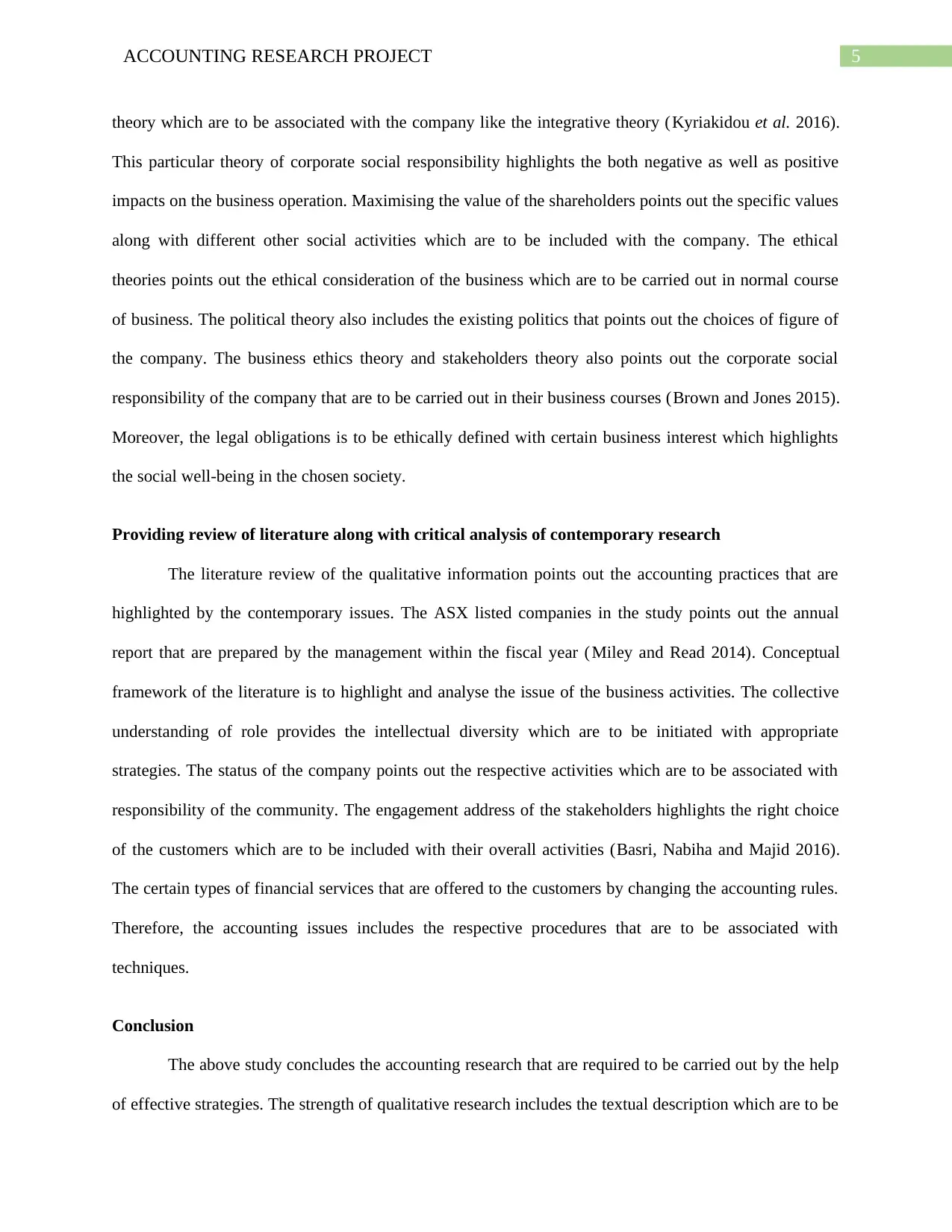
5ACCOUNTING RESEARCH PROJECT
theory which are to be associated with the company like the integrative theory (Kyriakidou et al. 2016).
This particular theory of corporate social responsibility highlights the both negative as well as positive
impacts on the business operation. Maximising the value of the shareholders points out the specific values
along with different other social activities which are to be included with the company. The ethical
theories points out the ethical consideration of the business which are to be carried out in normal course
of business. The political theory also includes the existing politics that points out the choices of figure of
the company. The business ethics theory and stakeholders theory also points out the corporate social
responsibility of the company that are to be carried out in their business courses (Brown and Jones 2015).
Moreover, the legal obligations is to be ethically defined with certain business interest which highlights
the social well-being in the chosen society.
Providing review of literature along with critical analysis of contemporary research
The literature review of the qualitative information points out the accounting practices that are
highlighted by the contemporary issues. The ASX listed companies in the study points out the annual
report that are prepared by the management within the fiscal year ( Miley and Read 2014). Conceptual
framework of the literature is to highlight and analyse the issue of the business activities. The collective
understanding of role provides the intellectual diversity which are to be initiated with appropriate
strategies. The status of the company points out the respective activities which are to be associated with
responsibility of the community. The engagement address of the stakeholders highlights the right choice
of the customers which are to be included with their overall activities (Basri, Nabiha and Majid 2016).
The certain types of financial services that are offered to the customers by changing the accounting rules.
Therefore, the accounting issues includes the respective procedures that are to be associated with
techniques.
Conclusion
The above study concludes the accounting research that are required to be carried out by the help
of effective strategies. The strength of qualitative research includes the textual description which are to be
theory which are to be associated with the company like the integrative theory (Kyriakidou et al. 2016).
This particular theory of corporate social responsibility highlights the both negative as well as positive
impacts on the business operation. Maximising the value of the shareholders points out the specific values
along with different other social activities which are to be included with the company. The ethical
theories points out the ethical consideration of the business which are to be carried out in normal course
of business. The political theory also includes the existing politics that points out the choices of figure of
the company. The business ethics theory and stakeholders theory also points out the corporate social
responsibility of the company that are to be carried out in their business courses (Brown and Jones 2015).
Moreover, the legal obligations is to be ethically defined with certain business interest which highlights
the social well-being in the chosen society.
Providing review of literature along with critical analysis of contemporary research
The literature review of the qualitative information points out the accounting practices that are
highlighted by the contemporary issues. The ASX listed companies in the study points out the annual
report that are prepared by the management within the fiscal year ( Miley and Read 2014). Conceptual
framework of the literature is to highlight and analyse the issue of the business activities. The collective
understanding of role provides the intellectual diversity which are to be initiated with appropriate
strategies. The status of the company points out the respective activities which are to be associated with
responsibility of the community. The engagement address of the stakeholders highlights the right choice
of the customers which are to be included with their overall activities (Basri, Nabiha and Majid 2016).
The certain types of financial services that are offered to the customers by changing the accounting rules.
Therefore, the accounting issues includes the respective procedures that are to be associated with
techniques.
Conclusion
The above study concludes the accounting research that are required to be carried out by the help
of effective strategies. The strength of qualitative research includes the textual description which are to be
⊘ This is a preview!⊘
Do you want full access?
Subscribe today to unlock all pages.

Trusted by 1+ million students worldwide
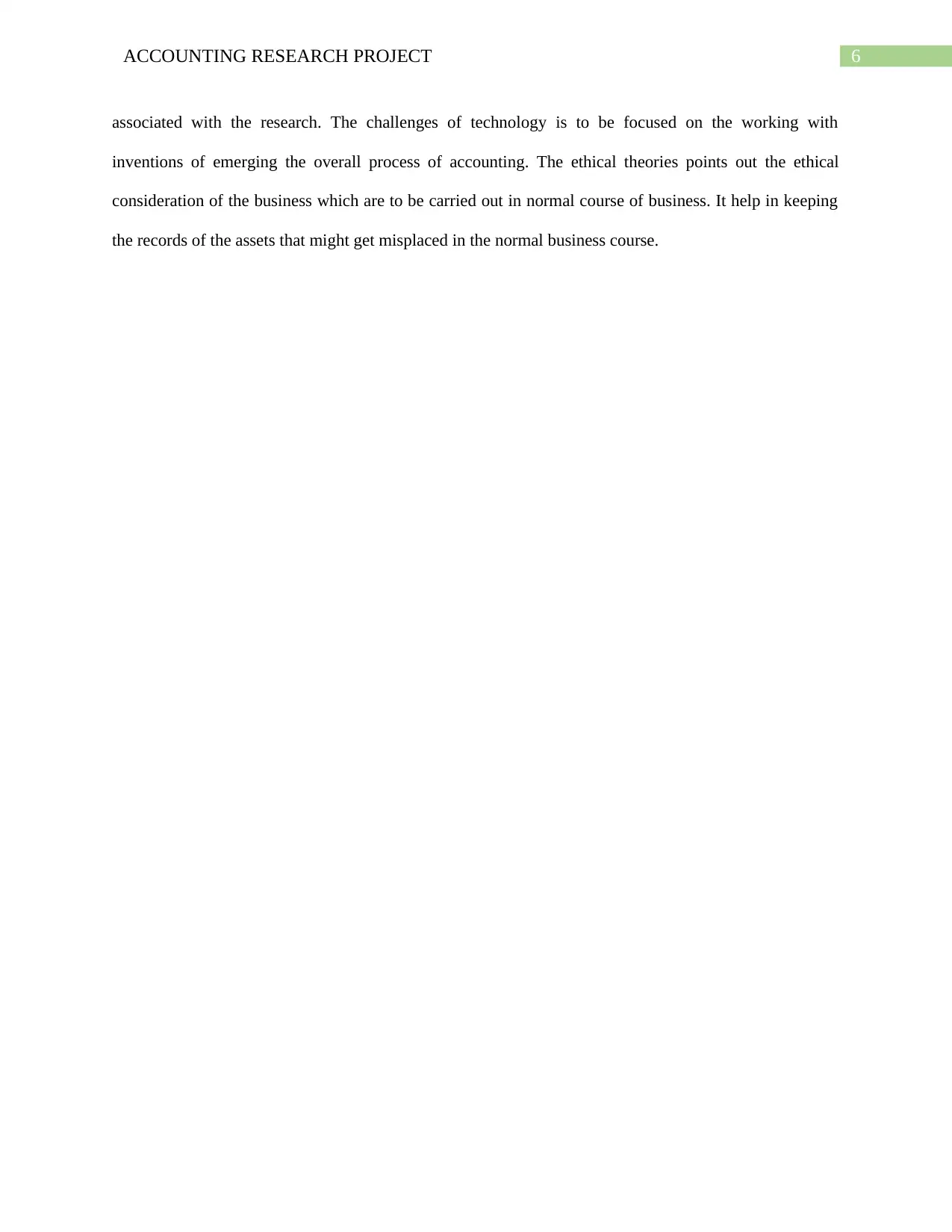
6ACCOUNTING RESEARCH PROJECT
associated with the research. The challenges of technology is to be focused on the working with
inventions of emerging the overall process of accounting. The ethical theories points out the ethical
consideration of the business which are to be carried out in normal course of business. It help in keeping
the records of the assets that might get misplaced in the normal business course.
associated with the research. The challenges of technology is to be focused on the working with
inventions of emerging the overall process of accounting. The ethical theories points out the ethical
consideration of the business which are to be carried out in normal course of business. It help in keeping
the records of the assets that might get misplaced in the normal business course.
Paraphrase This Document
Need a fresh take? Get an instant paraphrase of this document with our AI Paraphraser
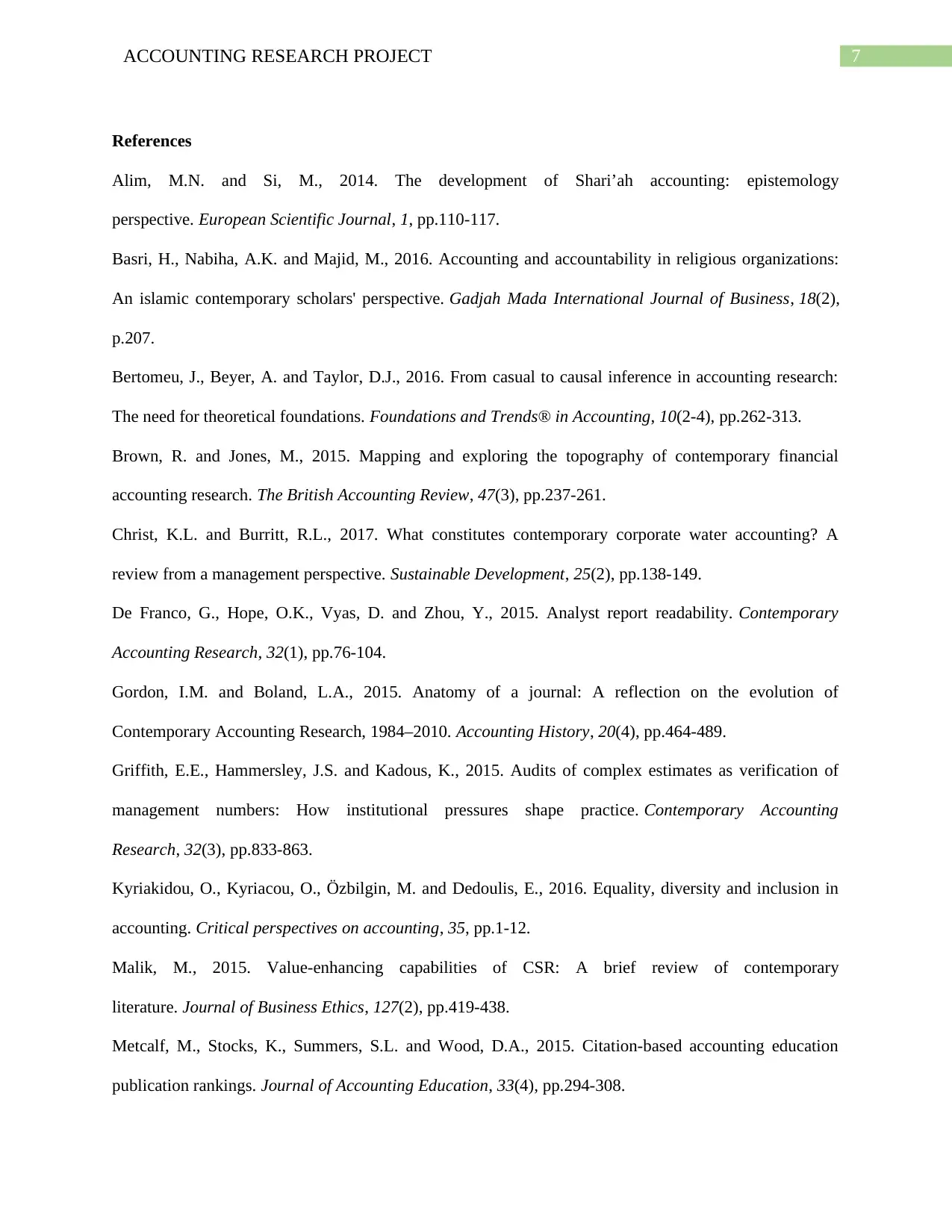
7ACCOUNTING RESEARCH PROJECT
References
Alim, M.N. and Si, M., 2014. The development of Shari’ah accounting: epistemology
perspective. European Scientific Journal, 1, pp.110-117.
Basri, H., Nabiha, A.K. and Majid, M., 2016. Accounting and accountability in religious organizations:
An islamic contemporary scholars' perspective. Gadjah Mada International Journal of Business, 18(2),
p.207.
Bertomeu, J., Beyer, A. and Taylor, D.J., 2016. From casual to causal inference in accounting research:
The need for theoretical foundations. Foundations and Trends® in Accounting, 10(2-4), pp.262-313.
Brown, R. and Jones, M., 2015. Mapping and exploring the topography of contemporary financial
accounting research. The British Accounting Review, 47(3), pp.237-261.
Christ, K.L. and Burritt, R.L., 2017. What constitutes contemporary corporate water accounting? A
review from a management perspective. Sustainable Development, 25(2), pp.138-149.
De Franco, G., Hope, O.K., Vyas, D. and Zhou, Y., 2015. Analyst report readability. Contemporary
Accounting Research, 32(1), pp.76-104.
Gordon, I.M. and Boland, L.A., 2015. Anatomy of a journal: A reflection on the evolution of
Contemporary Accounting Research, 1984–2010. Accounting History, 20(4), pp.464-489.
Griffith, E.E., Hammersley, J.S. and Kadous, K., 2015. Audits of complex estimates as verification of
management numbers: How institutional pressures shape practice. Contemporary Accounting
Research, 32(3), pp.833-863.
Kyriakidou, O., Kyriacou, O., Özbilgin, M. and Dedoulis, E., 2016. Equality, diversity and inclusion in
accounting. Critical perspectives on accounting, 35, pp.1-12.
Malik, M., 2015. Value-enhancing capabilities of CSR: A brief review of contemporary
literature. Journal of Business Ethics, 127(2), pp.419-438.
Metcalf, M., Stocks, K., Summers, S.L. and Wood, D.A., 2015. Citation-based accounting education
publication rankings. Journal of Accounting Education, 33(4), pp.294-308.
References
Alim, M.N. and Si, M., 2014. The development of Shari’ah accounting: epistemology
perspective. European Scientific Journal, 1, pp.110-117.
Basri, H., Nabiha, A.K. and Majid, M., 2016. Accounting and accountability in religious organizations:
An islamic contemporary scholars' perspective. Gadjah Mada International Journal of Business, 18(2),
p.207.
Bertomeu, J., Beyer, A. and Taylor, D.J., 2016. From casual to causal inference in accounting research:
The need for theoretical foundations. Foundations and Trends® in Accounting, 10(2-4), pp.262-313.
Brown, R. and Jones, M., 2015. Mapping and exploring the topography of contemporary financial
accounting research. The British Accounting Review, 47(3), pp.237-261.
Christ, K.L. and Burritt, R.L., 2017. What constitutes contemporary corporate water accounting? A
review from a management perspective. Sustainable Development, 25(2), pp.138-149.
De Franco, G., Hope, O.K., Vyas, D. and Zhou, Y., 2015. Analyst report readability. Contemporary
Accounting Research, 32(1), pp.76-104.
Gordon, I.M. and Boland, L.A., 2015. Anatomy of a journal: A reflection on the evolution of
Contemporary Accounting Research, 1984–2010. Accounting History, 20(4), pp.464-489.
Griffith, E.E., Hammersley, J.S. and Kadous, K., 2015. Audits of complex estimates as verification of
management numbers: How institutional pressures shape practice. Contemporary Accounting
Research, 32(3), pp.833-863.
Kyriakidou, O., Kyriacou, O., Özbilgin, M. and Dedoulis, E., 2016. Equality, diversity and inclusion in
accounting. Critical perspectives on accounting, 35, pp.1-12.
Malik, M., 2015. Value-enhancing capabilities of CSR: A brief review of contemporary
literature. Journal of Business Ethics, 127(2), pp.419-438.
Metcalf, M., Stocks, K., Summers, S.L. and Wood, D.A., 2015. Citation-based accounting education
publication rankings. Journal of Accounting Education, 33(4), pp.294-308.
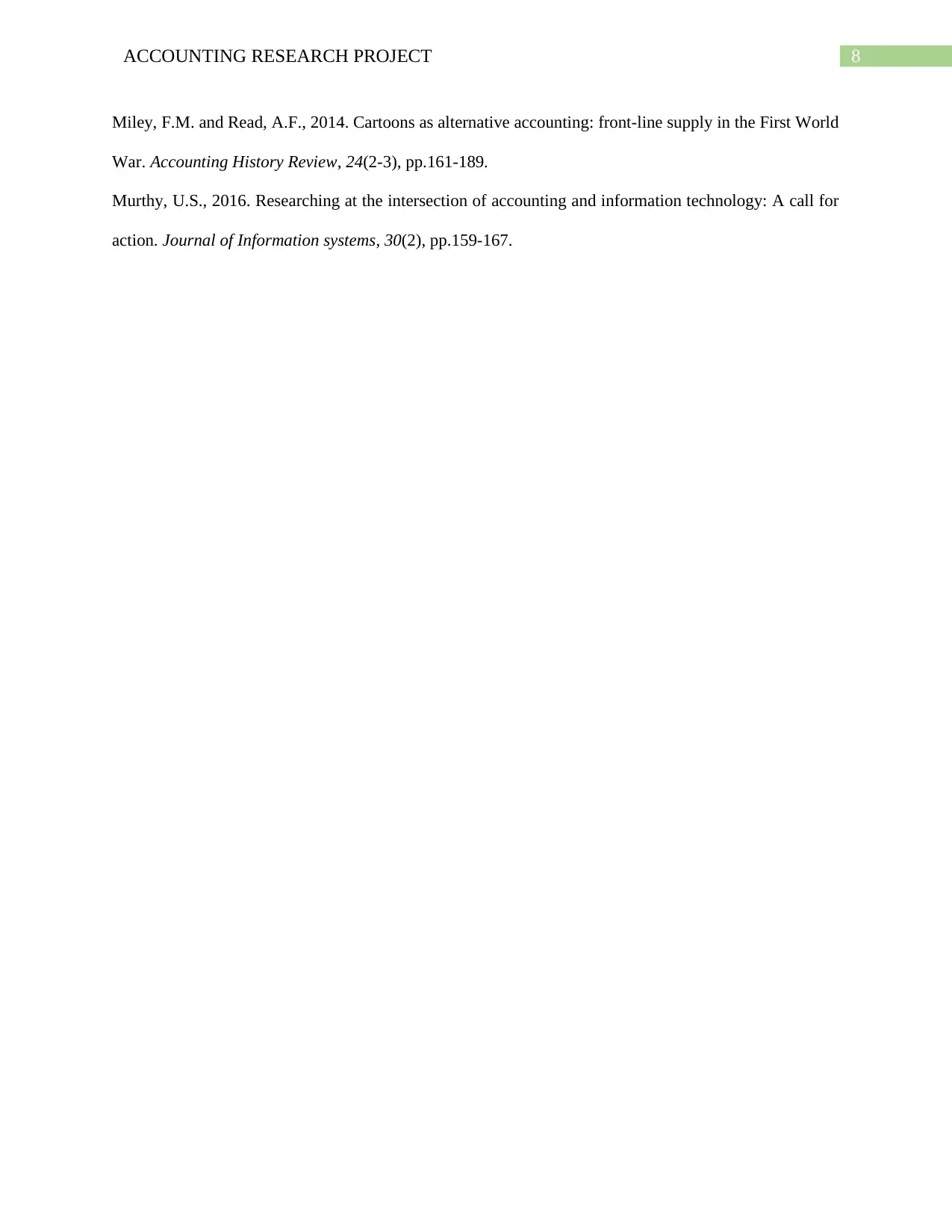
8ACCOUNTING RESEARCH PROJECT
Miley, F.M. and Read, A.F., 2014. Cartoons as alternative accounting: front-line supply in the First World
War. Accounting History Review, 24(2-3), pp.161-189.
Murthy, U.S., 2016. Researching at the intersection of accounting and information technology: A call for
action. Journal of Information systems, 30(2), pp.159-167.
Miley, F.M. and Read, A.F., 2014. Cartoons as alternative accounting: front-line supply in the First World
War. Accounting History Review, 24(2-3), pp.161-189.
Murthy, U.S., 2016. Researching at the intersection of accounting and information technology: A call for
action. Journal of Information systems, 30(2), pp.159-167.
⊘ This is a preview!⊘
Do you want full access?
Subscribe today to unlock all pages.

Trusted by 1+ million students worldwide
1 out of 9
Related Documents
Your All-in-One AI-Powered Toolkit for Academic Success.
+13062052269
info@desklib.com
Available 24*7 on WhatsApp / Email
![[object Object]](/_next/static/media/star-bottom.7253800d.svg)
Unlock your academic potential
Copyright © 2020–2026 A2Z Services. All Rights Reserved. Developed and managed by ZUCOL.





